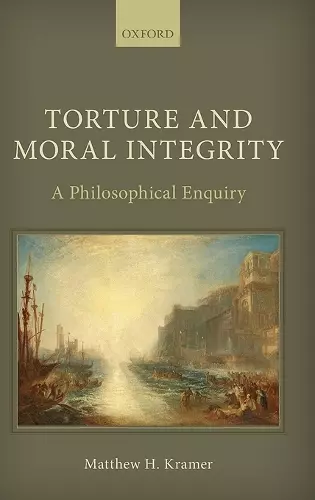Torture and Moral Integrity
A Philosophical Enquiry
Format:Hardback
Publisher:Oxford University Press
Published:17th Apr '14
Currently unavailable, and unfortunately no date known when it will be back
This hardback is available in another edition too:
- Paperback£39.99(9780198842590)

Torture and Moral Integrity is about the wrongness of torture and the nature of morality. It discusses multiple types of torture with great philosophical acuity and it seeks to explain why interrogational torture and other types of torture are always and everywhere morally wrong. At the same time, it rigorously plumbs the general structure of morality and the intricacies of moral conflicts and it probes some of the chief grounds for the moral illegitimacy of various modes of conduct. It sophisticatedly defends a deontological conception of morality against some subtle critiques that have been mounted during the past few decades by proponents of consequentialism. The book tackles a concrete moral problem: a problem that has been heatedly debated during recent years in the governmental and military institutions of many countries as well as in academic circles. At the same time it tackles some very abstract issues in moral and political philosophy. Moreover, as becomes apparent at numerous junctures, the abstract ruminations and the concrete prescriptions are closely connected: Kramer's recommendations concerning the legal consequences of the perpetration of torture by public officials or private individuals, for example, are based squarely on his more abstract accounts of the nature of torture and the nature of morality. His philosophical reflections on the structure of morality are the vital background for his approach to torture, and his approach to torture is a natural outgrowth of those philosophical reflections.
The book under review is one of the most comprehensive intellectual efforts to address the thorny issue of torture that I have seen. . . Putting the discussion of torture in the broader perspective of torture in general and of the nature of morality is not the only merit of this book; Kramer also zooms in on the particularities that come with interrogational torture. He discusses and analyses in great detail competing interpretations of the wrongfulness of torture by drawing on a wealth of cases. As a result, Kramers book provides us with an extensive overview of the recent discussion on (interrogational) torture. The manner in which he dissects these interpretations and cases is often illuminating. . . Even if one is not convinced by Kramers distinction between moral permissibility and moral optimality, the book still provides a comprehensive treatment of the literature on torture. * Thomas Mertens. Netherlands International Law Review *
As one would expect from Kramer, he. . .is very convincing in his arguments. [T]he book is well written, concise and engaging. . . Kramer is so convincing in his argument that it will be impossible for a reader to read Dershowitz without recalling the faults considered by Kramer. . . Kramer's book invites lawyers to think again about generally held presuppositions about the legality of torture. * Christy Shucksmith, International Criminal Law Review *
Torture and Moral Integrity is an impressively comprehensive treatment of its subject. Kramer painstakingly develops a taxonomy of torture that is far more detailed than is usually found in this literature, and advances acute challenges to many of its most prominent figures (such as Shue, Nagel, and Dershowitz). [H]is book remains a valuable resource for anyone trying to think honestly about the moral and legal status of torture in light of all the purposes that it might seem to serve. * David Sussman, Law and Philosophy *
In Torture and Moral Integrity Matthew Kramer carefully and thoughtfully develops an argument for an absolute moral prohibition on most types of torture. The book's structure reflects Kramer's commitment to starting from the most foundational questions, like the general structure of morality and building up to more practical and concrete questions...Kramer's book is a must for anyone seriously considering the question of torture, for a number of reasons: one, it is one of the most thorough analyses of the breadth of literature on torture; two, it starts from the most foundational questions and builds up to concrete, practical proposals and three, it is genuinely original. * Jovana Davidovic, Analysis *
ISBN: 9780198714200
Dimensions: 240mm x 162mm x 29mm
Weight: 700g
368 pages